Meet the Millennials Investing in Mid-Maine
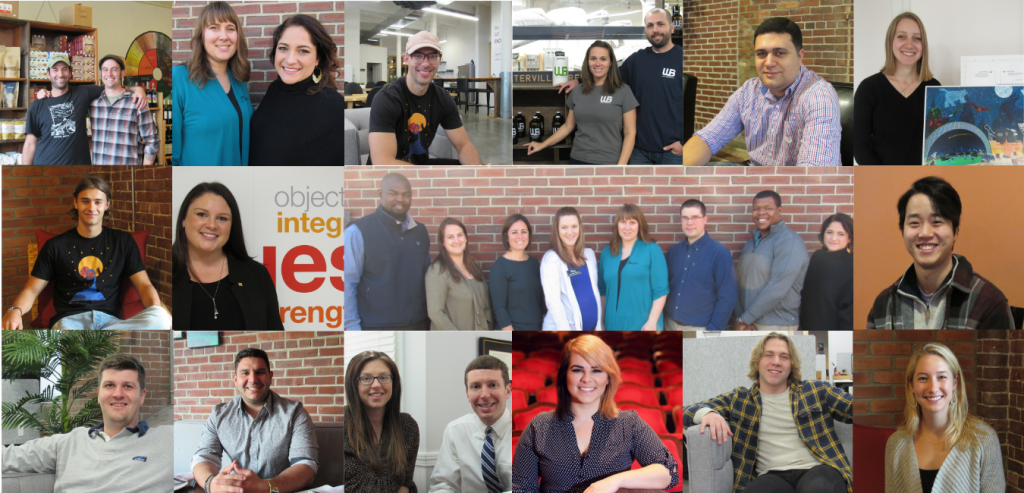
WATERVILLE, ME – In this New England city, a millennial brother-sister duo invests in real estate a block down from the regional headquarters of a global IT company. Upstairs from that company, entrepreneurial college students burn the midnight oil with their instructor, who is bootstrapping a software product. They use office space in a separate coworking and innovation space in a redeveloped mill complex, across the hall from a craft brewery established by a young couple. Within the same complex is a major arts non-profit, whose Opera House is executive directed by a woman under thirty. You might assume this is happening in Boston or Portland, but it is actually occurring in Waterville, Maine.
The revitalization of Waterville has been spurred by multi-million dollar investments from large institutions like Colby College and North River Company. Their vision and capital transformed the vacant lots of this riverside city, bringing people to the downtown district and former mill buildings. New businesses followed, and the city’s population increased by nearly six percent. Yet, there is a lesser-known, hardworking group of millennial leaders who have invested their own time, energy, and capital to ensure the sustained vibrance of their city.
Many of Waterville’s young leaders grew up locally, though a few have made the city their home base after graduating from college. Tom and Tracy Nale, attorneys who invest in the city’s residential and commercial real estate, hail from a long line of Waterville natives. Tamsen Warner, executive director of Waterville Opera House also grew up in the city, while Candice Flaherty, co-owner of Waterville Brewing Company, and Samantha (Sam) Burdick, vice president of the young professionals group KV Connect, were raised in nearby Oakland.
Molly Woodward, president of KV Connect, fell in love with Waterville while she studied at Thomas College. Caitlin Bacon, who grew up in Sidney, also attended Thomas College and joined tech firm CGI, Inc. after graduation.
While their backgrounds and interests differ, the millennials’ enthusiasm for Waterville and its future is shared.
The Real Estate Developers
 “Most of what we hear is that young, educated people are leaving rural Maine, but it’s important to see that many are staying here and investing – it can be done,” remarks Tracy Nale Sewall, attorney at Nale & Nale Law. “We hope that trend continues and grows.” Tracy and her brother Tom are propelling that trend as Waterville natives who graduated from Colby College, joined the family law practice, and began to invest in residential and commercial real estate.
“Most of what we hear is that young, educated people are leaving rural Maine, but it’s important to see that many are staying here and investing – it can be done,” remarks Tracy Nale Sewall, attorney at Nale & Nale Law. “We hope that trend continues and grows.” Tracy and her brother Tom are propelling that trend as Waterville natives who graduated from Colby College, joined the family law practice, and began to invest in residential and commercial real estate.
While residential real estate development ran in the family – Tom Nale Sr. built near a dozen homes on Country Way and Mountain Farm Road in Waterville – the younger generation expanded into commercial properties with the purchase of the historic Arnold Block. “The number one reason [for the purchase] was the opportunity to be on Main Street,” explains Tom. Adds Tracy, “There’s a confluence of so many different, positive things happening at the same time – Colby’s investments, which have spurred individual investments, the BUILD grant, the Opportunity Zone, and the Lockwood Mills redevelopment make the downtown a very appealing place to be investing.”
Downtown Waterville was not always an attractive investment, and the Nale siblings experienced the city’s highs and lows as the local mills reached maximum capacity then quickly declined. But while the city is still in revitalization mode, it offers significant advantages over the frothy markets in larger cities.
“Tracy and I wouldn’t be breaking into cities like Portland or Boston at our age – we’d need to wait until we were more capitalized and more knowledgeable of the players,” explains Tom. “Here in Waterville, there’s an accessibility and proximity that you can’t get in larger cities. It’s less expensive, and you build a rapport more easily. You know your contractor.”
As Tom and Tracy continue to gain experience and exposure at a rate they couldn’t get in a larger city, they encourage fellow millennials to get involved in small, rural cities where “you can be your own boss, make your own decisions, and shape your community.”
The Tastemakers
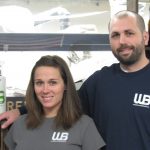 For ten years, Ryan Flaherty brewed beer at his Winslow home to share with family and friends. The “pipe dream” of opening his own brewery came closer to reality when the opportunity to purchase industrial brewery equipment arose, but the equipment sat unused in his garage for a year.
For ten years, Ryan Flaherty brewed beer at his Winslow home to share with family and friends. The “pipe dream” of opening his own brewery came closer to reality when the opportunity to purchase industrial brewery equipment arose, but the equipment sat unused in his garage for a year.
“I supported him because it was his dream and because it was a legitimate product,” explains his wife Candice. The Flahertys knew the market would have very high expectations for Waterville’s first microbrewery, so they were extremely focused on providing a high-quality, creative product in a laid-back atmosphere that the city had not yet experienced. They chose a space in Hathaway Creative Center to open Waterville Brewing Company, becoming not only the city’s first microbrewery but also an important addition to a building that initiated Waterville’s revitalization from its manufacturing past.
Though family ties and a great school system encouraged Candice and Ryan to put down roots in Winslow, downtown Waterville offered no such incentive. “It was shabby, there were a lot of vacancies,” remembers Candice. “But when we had kids, Waterville started to turn over a new leaf. We thought, ‘let’s stay and build something here.’”
The brewery they built adds to Waterville’s growing culinary diversity, which the Flahertys see as a big draw for tourists and residents. “Everyone likes the small town feel and the fact that you can still get a great restaurant scene and variety,” explains Candice. Adds Ryan, “There’s a lot at stake to maintain downtown Waterville as an attraction, but we’re lucky that we have community and institutional leaders who are truly invested.”
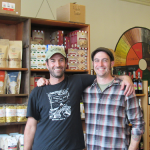
David [left] and Josh [right].
While Fairfield is smaller than Waterville, its downtown sits at a major crossroads in Maine which David and Josh see as a major incentive. “Our mission is to inspire other businesses to be here,” says Gulak. “The wine shop wasn’t enough, so we opened Meridians Kitchen & Bar. Soon, my wife Emilie will open ‘A Happy Small Place’, a kid-friendly coffee shop on Main Street.”
The quality and uniqueness of the product offered by the Meridians businesses may feel atypical of a small downtown, but David and Josh believe Fairfield is the perfect environment to be pioneers. “People in central Maine want new stuff – they’re commuting to Portland for it,” says Josh. David adds, “Central Mainers don’t get the credit they deserve. There’s a defeatist attitude that people won’t pay for quality, but we’ve found the opposite to be true here. You just need to have faith, put in all your effort, and focus on customer service.”
The Creators
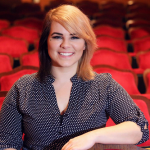
For leaders like Tom, Tracy, Ryan, and Candice, greater Waterville was always the place they wanted to put down roots. But Waterville Opera House Executive Director Tamsen Warner had to learn how to fall in love with the city that had felt too small for her arts aspirations. Fortunately, time away from home gave her the space to appreciate Waterville in a new way. When she left to study theater and scenic painting at the University of Connecticut, she realized, “Waterville has a lot of great arts assets.” Her new positive outlook toward her hometown strengthened after spending time in New York City, where she discovered, “while I love the hustle and bustle of the big city, it’s not where I want to live.”
When Tamsen returned home to Waterville, unsure if she would stay, she immediately contacted the Waterville Opera House where she had performed since age 12. A part-time job turned into full-time, and Tamsen became enmeshed in an arts and culture scene punching above its weight class.
“We have something really unique here with Waterville Creates!” she explains, noting the arts non-profit which supports and promotes high-quality, accessible arts programming in Waterville, including the Opera House. “There are only a few organizations like it in North America. Waterville is a small town, but it has amazing arts assets. The caliber is super high for a rural setting.”
Tamsen plans to extend that caliber by introducing new performing arts series and innovations found currently in larger cities. As an executive director under thirty, she does wrestle with the challenge of not being taken seriously, but she finds that just as many community members are encouraged that a young Waterville native is excelling in her field in her hometown.
Waterville’s arts and cultural programming has been a constant beacon of hope as the economy transitioned from manufacturing to a more diverse, knowledge-based portfolio of businesses. Other millennial leaders like Molly Woodward, co-chair of Waterville’s young professionals group KV Connect, recognize Waterville’s arts and culture scene as a critical driver of tourism and quality of life for residents. “Our best advantage is arts and culture,” she says. “I see us being the arts and culture destination not only in mid-Maine but statewide as well.”
The Innovators
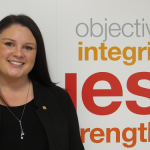 Caitlin Bacon has always been comfortable with computer sciences, and after graduating with an MBA from Thomas College, she became an integral part of Waterville’s emerging technology sector. She joined Collaborative Consulting, the first player in the city’s IT field, which was soon acquired by CGI, a global technology consulting firm, and rose through the ranks to become the Head of Operations for the New England Business Unit in just two years.
Caitlin Bacon has always been comfortable with computer sciences, and after graduating with an MBA from Thomas College, she became an integral part of Waterville’s emerging technology sector. She joined Collaborative Consulting, the first player in the city’s IT field, which was soon acquired by CGI, a global technology consulting firm, and rose through the ranks to become the Head of Operations for the New England Business Unit in just two years.
“I knew that the tech field was only going to grow larger and more advanced as time progressed, so I decided to give it a try. I have come to love this industry! I have learned so much from my role at CGI, from the development side to business intelligence to analytical work. I learn more every day and it all still fascinates me,” she explains.
As a Sidney, ME native, Caitlin attended the Messalonskee district schools and played ice hockey in greater Waterville, becoming part of the emergence of girls’ high school ice hockey in Maine. As a child, she played at the Inside-Outside playground, shopped downtown, and performed dance recitals at the Waterville Opera House, which remained a mainstay throughout the downtown’s decline. When she was in junior high, Caitlin noticed the downtown storefronts becoming vacant as people moved to the suburbs and shopped in malls. She graduated from Colby-Sawyer College in New Hampshire with a business degree and worked post-graduation in southern Maine. She returned home to central Maine where she and her husband have family roots, settling here and earning her MBA at Thomas College. She says, “Now that I am back in the Waterville area and working downtown at CGI, it makes me so happy to see life being brought back to the street and the businesses here. I’m so excited to see what else comes to the downtown area to help return it to the way it used to be!”
Not only does Caitlin personally appreciate Waterville’s growth, but she also sees it as a professional recruitment tool for the IT field. “The IT field is so broad, that you can literally work from anywhere,” she explains. “That’s one great thing about the revitalization of Waterville – we are bringing back the excitement to the city and making people want to visit, work, and live here. Since revitalizations don’t happen overnight, it’s been a struggle to get people from outside the area, specifically outside of Maine, to want to come live and work here. Once they experience the town and all we have to offer, we’ve had some great talent relocate here and remain in the area!”
The Engagers
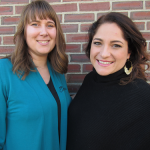
Molly [left] and Samantha [right].
As young professionals looking to jumpstart their career, Waterville offered both women a very supportive environment. Molly interned with the Mid-Maine Chamber of Commerce while studying at Thomas College, “soaking up [President and CEO] Kim’s passion for what she does and falling in love with the tight-knit business community which worked together to grow.” Her business connections through the Chamber allowed her to pursue a career in finance in the city, and she serves on boards of community service organizations like Habitat for Humanity and the Lions Club.
As Waterville continues to revitalize and its population continues to grow, Molly and Sam are working to ensure that KV Connect capitalizes on the city’s appeal to young people. “Our goal is to be the go-to group for networking, where large employers send their employees to build skills,” explains Molly. Adds Sam, “The challenge we’re tackling is debunking the myth that networking is scary. Our hope is to be the stepping-stone to networking. It can be challenging and intimidating to break into a tight-knit community, but we have the tools to help you succeed.”
Sam, director of marketing at GHM and The Elm and a new member of the Waterville Planning Board, used her networking skills to begin a career in politics. “It wouldn’t be easy to start a political career in Boston where I went to school, but here it’s easy to climb the ladder, connect with people, get opportunities – someone will take a chance on you. It’s a really good way to build a career, and it’s really easy to make a name for yourself in a small city.”
With the success of KV Connect’s flagship program, Green Drinks, Molly and Sam plan to expand programming to attract a wider variety of young professionals, including those not involved in the business community. Molly explains, “I love the camaraderie – it’s ours. We do this. It gives us a part of the growth in Waterville.”
The impact of millennial investing
The locals who returned to Waterville and those who were attracted here are not only part of the city’s impressive population growth, but also a major force strengthening the increase. Growing nearly six percent from 2010-2018, the city is defying statewide trends of population decrease in rural areas.
“Right now, downtown Waterville and the Greater Waterville region are becoming one of the most dynamic places in the state of Maine, with high-growth industries, high-wage jobs, and a talent pool of young, educated workers and college students. In contrast to other cities in Maine, New England, and beyond that are becoming exorbitantly priced or saturated, this local economy is ripe with opportunity,” says Garvan D. Donegan, director of planning and economic development for the Central Maine Growth Council.
“It is wonderfully unique and powerful for regional economic growth to have a local bedrock of institutional support and venture as well as a supportive environment for this and the next generation to capitalize on ‘ground level’ investment opportunities. These opportunities may already be present, or an entrepreneur may tap into our tech and knowledge-based workforce in order to build out a brilliant team and create the next best idea. Whatever the project, we have the tools and networks to support innovation and the track record of deploying creative public-private incentive packages that reduce risk, jump-start projects, and present a more favorable return profile.”
With millennial leadership in key sectors across the city, the revitalization of Waterville retains authenticity and sustainability. It is a movement bolstered by locals who want to see their community thrive and are willing to put capital and sweat equity into realizing that vision. They are in it for the long-term, creating a better city for their future generations to enjoy.



